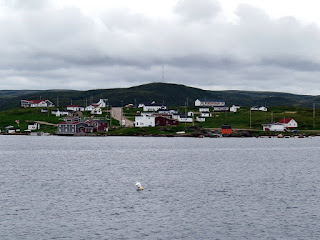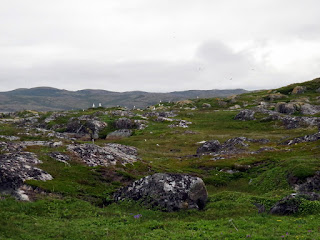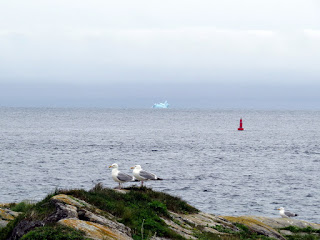The town of Red Bay sits at the end of the paved
road. As you turn into Red Bay, there is
a large yellow sign warning you not to enter the dirt road into the interior if
its lights are flashing, as the road is not passable. This stop is the most interesting to me
because of the fascinating history of the Basque fishermen, who first came here
starting in the early 1530's to establish seasonal whaling stations for hunting
whales that were here in large numbers. It was a grueling operation under
difficult conditions. They chose Red Bay
because of the natural protective harbor
with easy access to the sea.
There is a visitor center that explains the history
and trials of these whalers. When
underwater shipwrecks were confirmed to exist, a massive excavation was
undertaken to study them. A number of
vessels were discovered including a full size ocean going whaler along with the
chase boats and other equipment. Several smaller boats were brought to shore
and the larger vessels studied in great detail. In order to preserve these
vessels, after the study was complete, they were reburied on the harbor floor
to preserve them.
Across the harbor from Red Bay is Saddle Island,
where the Basques set up their summer camps and performed most of the
processing of the. whales. The primary
product that was shipped back to Europe was oil for use in lights. Due to the importance of the site, it has
been declared a UNESCO world heritage site. The island has also been excavated
to better learn about the activities of the whalers during their 70 years of
whaling. They only abandoned the site
when the whales were depleted to the extent that it was no longer profitable.
We took a small boat to the island to walk where these
whalers worked for so many decades and observe some of the evidence of what
they left behind. Like the harbor
excavation, the unearthed materials on the island were either removed to shore
or reburied to protect them. You do not
get to see much original material but it is a great , if chilly, walk around
the island, reading the various
interpretive boards along the way. The
life of these whalers was very hard and many did not return home. In 1576, a number of the whaling ships were
trapped in the ice and the crews were forced to winter over on the island with
little preparations. During the
excavations, sixty two graves were located which contained at least 140 men and
boys.
The island has some wonderful views and lots of
seagulls. They seemed particularly fond
of Anneke and made numerous dives at her ahead.
Perhaps they were only wanting her hair for their nests.


































9 comments:
Very interesting! Can't imagine the hardship and work it must have been to eek out a living and fight the whales back in the 1500's. And that would be if everything went well! Great write up -- very interesting. We've been to Red Bay AL...now I know of two but there must be even more Red Bays..
That iceberg photo is awesome.
There would be no way I could have survived doing that job! Would I get in those little boats....no way! Interesting story.
I was surprised there was no Tiffin Factory there. ;c)
One can just imagine the hardships those whalers went through, not a lifestyle for me!
How interesting that they rebury the ships and artifacts.
Fascinating history. Our friend from Newfoundland is here in AJ and I'm going to have to ask her if she's ever done that tour.
Your photography is so good, and it really makes me wish I could see Labrador for myself.
Love your pictures of the little town and the island. Boy that was a long long way for the Basques to come. You have sure done a lot on Labrador. I love seeing the blue icebergs though it's so sad to think they are doomed to extinction.
Icebergs and boats rotting away. Labrador is fascinating and looks quite cold and inhospitable.
We really enjoyed Red Bay and its fascinating museum. Kinda nice to see icebergs this time of year. Did you guys get to Battle Harbour? That road to Red Bay was a humdinger!
Post a Comment